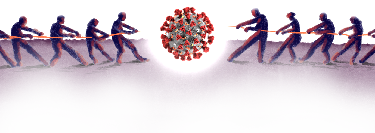Amazon profits from coronavirus conspiracies
Sign up here to get the next edition of this newsletter, straight to your inbox.
AMAZON’S COVID-19 DISINFORMATION PROBLEM
By Erica Hellerstein
On Monday morning, I was chatting with a friend on WhatsApp when my messages abruptly stopped sending. A massive global outage had forced Facebook, Instagram and WhatsApp to temporarily shut down, unleashing mass panic online.
As the blackout stretched from one hour to two, I mulled some very Coda-appropriate thoughts. What would life look like if the three platforms… just didn’t come back? What effect would their disappearance have on the health conspiracy ecosystem? Would the Infodemic feel their absence?
The fact is that, while much of the public attention on Covid-19-related misinformation is focused on social media, another, far less scrutinized platform is quietly providing fertile ground for misinformation: Amazon.
The online retailer is a hotbed for vaccine conspiracies and coronavirus myths. Go ahead and type “Covid-19” into the Amazon search bar. For me, the first book that pops up is “The Truth About Covid-19: Exposing the Great Reset, Lockdowns, Vaccine Passports,” by Joseph Mercola. According to the New York Times, Mercola — who was banned by YouTube last week — is “the most influential spreader of coronavirus misinformation online.”
Other books that appear in Amazon’s top search results for “Covid-19” include titles such as “Is Covid-19 a Bioweapon?” and “Covid-19 and the Global Predators: We Are the Prey.” When I searched for “vaccine,” the first book was, once again, Mercola’s “The Truth About Covid-19.”
A number of studies have highlighted how Amazon directs people to vaccine and health misinformation. Elise Thomas, the author of a report from the UK-based think tank the Institute for Strategic Dialogue told me about the platform’s recommendation algorithms, which show users what other customers who have clicked on a given book have purchased and viewed.
Thomas’s study found that Amazon’s recommendation system steers users toward extremist literature, including white nationalism and anti-vaccine conspiracies. “I was shocked by the cornucopia of weirdness in the recommendations,” she said.
In January 2021, a study by researchers with the University of Washington showed that more than 10% of searches using the term “vaccine” promoted books containing anti-vaccine conspiracies and health misinformation. The findings were cited in a stern letter from U.S Congressman Adam Schiff, a California Democrat, to Amazon CEO Andy Jassy last month.
“As long as these materials remain on the site, Amazon is directly profiting from the sensationalism of anti-vaccine misinformation, while these conspiracy theories continue to directly contribute to Covid-19 deaths,” he wrote.
IN OTHER INFODEMIC NEWS
Another wave of coronavirus infections is sweeping through Russia. Cases are through the roof: over 27,000 tested positive on October 6 and the daily death toll surpassed 900 for the first time since March 2020. Officials, meanwhile, are struggling to convince people to vaccinate. Earlier this week, Russian media reported that the administration of the Western Kursk region will cut off funding to districts with vaccination rates lower than 55%. It has now announced that areas with higher rates will receive additional funding.
The black market for fake Covid-19 vaccine certificates is also booming. According to a recent report from the software company Check Point, the number of Telegram channels hawking sham vaccine cards has soared tenfold over the past two months. In August, Check Point counted about 1,000 vendors on the messaging platform. That number has climbed to over 10,000 today.
The Soviet Union’s legacy may be driving vaccine hesitancy in Ukraine. More than half of the population is still skeptical about Covid-19 shots, and only 14% of Ukrainians have been fully inoculated against the virus. Sociologist Pavlo Fedorchenko-Kutuev believes that this uncertainty may be linked to government mistrust dating back to the Soviet era. Events like the 1986 explosion of the Chernobyl nuclear power plant have had a lasting impact on Ukrainians, fueling suspicion of authorities and eroding confidence in state institutions. “You would often rather ask a friend or Google than go to the doctor or listen to the government,” he said.
Alexandra Tyan, Marta Biino and Katia Patin all contributed to this week’s Infodemic.Sign up here to get the next edition of this newsletter, straight to your inbox.



